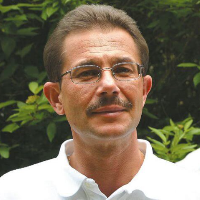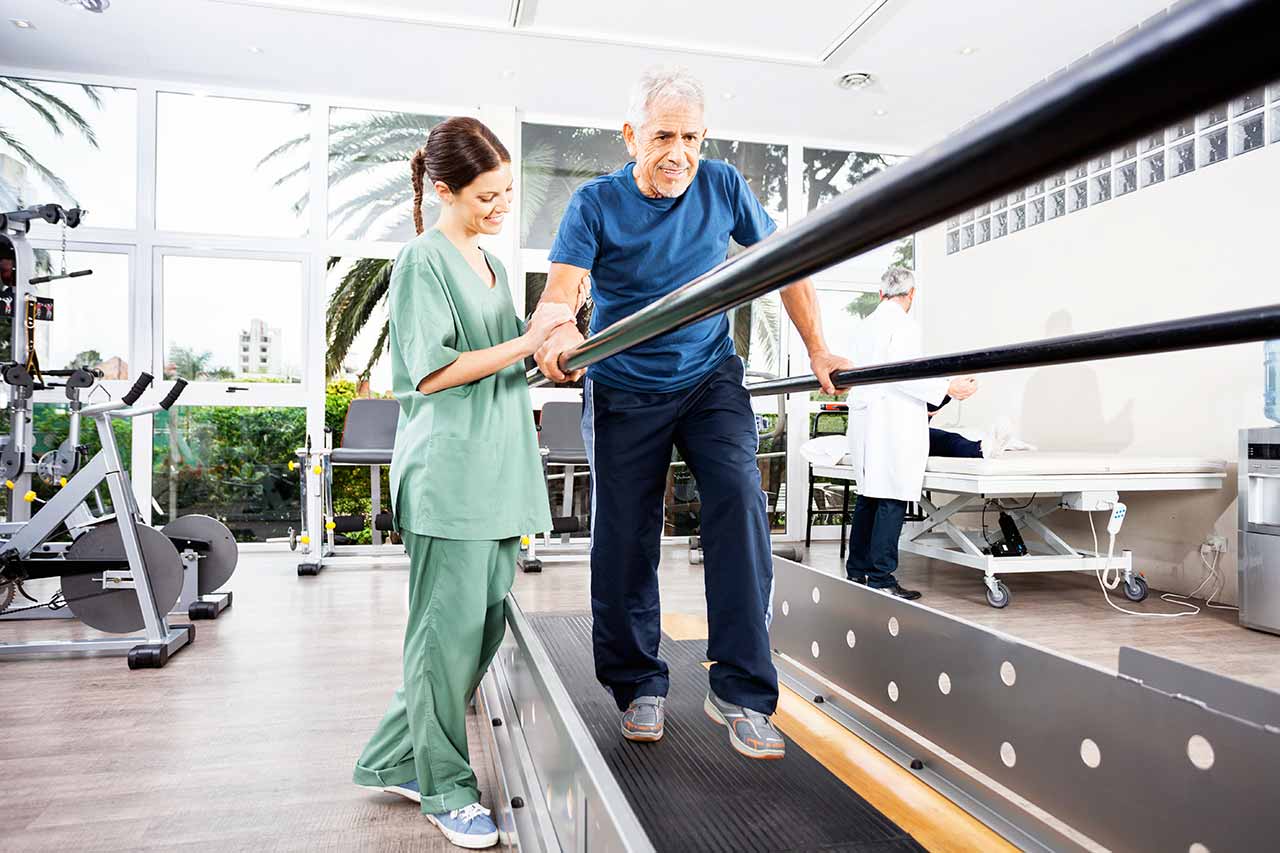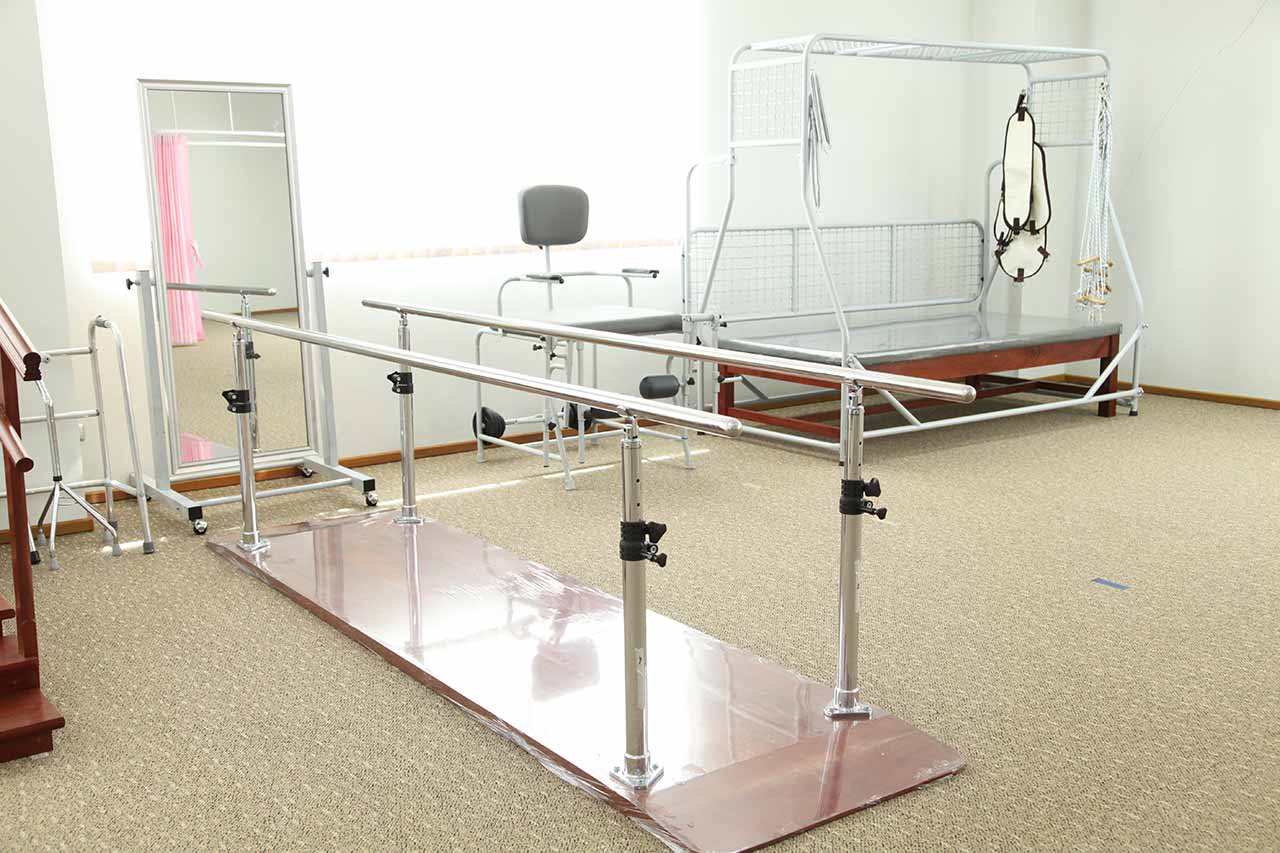
The program includes:
- Initial presentation in the clinic
- clinical history taking
- review of medical records
- physical examination
- laboratory tests:
- complete blood count
- general urine analysis
- biochemical analysis of blood
- inflammation indicators
- indicators of blood coagulation
- x-ray of the limb
- CT examination (on indication 650€)
- nursing services
- consultation of related specialists
- consultation of the chief physician and all leading experts
- development of individual treatment plan
Required documents
- Medical records
- X-ray examination, MRI/CT scan (if available)
Service
You may also book:
 BookingHealth Price from:
BookingHealth Price from:
About the department
According to the Focus magazine, the Department of Orthopedics and Orthopedic Rehabilitation at the Clinic Limberger ranks among the top German medical facilities specializing in orthopedic rehabilitation!
The department offers the full range of prevention and treatment for musculoskeletal diseases. Of particular interest is the rehabilitation of patients with degenerative diseases of large joints and previous musculoskeletal injuries. The department's experienced doctors have a variety of therapeutic techniques to guarantee the patient the restoration of mobility and the elimination of pain. The duration of the rehabilitation course is about 3 weeks. The complex of rehabilitation measures is selected on an individual basis, based on the degree of damage to the musculoskeletal system and the patient's general health condition. Standard orthopedic rehabilitation programs include exercise therapy, physiotherapy, diet therapy, and psychological support. The treatment concept is based on an individual approach, a respectful and friendly attitude, and an understanding of the patient's needs and wishes. The goal of the department's doctors is to help the patient get rid of movement disorders and return him to a full life. The department is headed by Dr. med. Herbert Wölfl.
An important focus of the department's medical team is rehabilitation treatment after joint replacement surgery (hip, knee, shoulder, and ankle arthroplasty), spinal surgery, and lower limb amputation. The doctors at the medical facility also treat patients with joint and spinal degenerative diseases. The department's competence also includes rehabilitation after injuries, dislocations, and fractures.
During the initial appointment, the department's specialist studies the patient's medical history, carries out an examination, and prescribes a complex of diagnostic tests to assess the person's general health condition and determine his rehabilitation potential. Based on the diagnostic results, an optimal course of rehabilitation with particular goals is developed. As a rule, the duration of an intensive course of rehabilitation is 2-3 weeks, after which the patient receives recommendations for therapeutic exercises at home. First of all, the department's doctors strive to restore mobility as much as possible and save the patient from pain. Treatment activities are then carried out aimed at achieving independence in everyday life and returning to professional activities.
The department's specialists use only reliable and effective methods in their clinical practice. The basis of any orthopedic rehabilitation program is the use of various approaches in therapeutic exercises, including training on special simulators, training in the swimming pool, Nordic walking, stretching, gymnastics with musical accompaniment, etc. An integral part of the therapeutic process is physiotherapy. The department's physiotherapists have excellent professional skills in massage, hydrotherapy, lymphatic drainage, electrotherapy, acupuncture, and other procedures.
During rehabilitation, experienced psychologists work with the patient. Many sessions with a psychologist are held in groups, whereby patients meet each other and exchange experiences with people who also struggle with complex orthopedic diseases. Relaxation therapy in groups is successfully carried out using autogenic training and progressive muscle relaxation. Whenever required, the department's psychologists are always ready for personal communication with the patient to provide him with the support necessary during the treatment and help him get rid of the depressive state.
A healthy diet also plays an important role in orthopedic rehabilitation. A balanced diet allows the patient to get nutrients and minerals for quick recovery. The department's nutritionists recommend patients eat foods high in protein, calcium, vitamin D, etc. In addition, the diet allows the patient to get rid of excess weight, since it creates additional load on the joints and slows down the rehabilitation process. The department is equipped with training kitchens, in which trained chefs hold classes on the preparation of hearty and healthy dishes.
The department's range of services includes the following:
- Prevention, treatment, and rehabilitation for degenerative joint diseases
- Pathological conditions after knee, hip, shoulder, and ankle replacement surgery
- Pathological conditions after spinal surgery for scoliosis, spinal canal stenosis, and spinal instability
- Pathological conditions after surgery for spinal disc herniations
- Pathological conditions after reconstructive surgery for shoulder joint diseases
- Pathological conditions after lower limb amputation
- Pathological conditions after radiosynoviorthesis
- Degenerative diseases of large joints and spine (arthrosis, spondylosis, and osteochondrosis)
- Prevention, treatment, and rehabilitation for musculoskeletal injuries and their complications
- Bone, joint, tendon, and muscle injuries and their complications, including war injuries
- Pathological conditions after osteosynthesis for fractures with or without joint involvement, including dislocations
- Pathological conditions after hip and knee transposition osteotomy after dislocations
- Pathological conditions after arthroscopy for joint ligament lesions
- Prevention, treatment, and rehabilitation for other diseases
The department's therapeutic options include:
- Therapeutic exercises
- Individual therapeutic exercises
- Manual therapy
- Proprioceptive neuromuscular facilitation
- Walking training
- Individual training plan on medical simulators and determination of isometric muscle strength
- Water aerobics (individually and in groups)
- Special aqua gymnastics (separate groups of patients with injuries of the hip joint, knee joint, and spine)
- Special spinal gymnastics and physical exercises for osteoporosis, strengthening veins, pelvic floor muscles, and back muscles
- Cardio workouts
- Physical exercises with musical accompaniment
- Therapeutic exercise using Nordic and classical walking, stretching, archery, and a treadmill
- Classes on an electric motor splint for fixing knee and shoulder joint fractures
- Individual therapeutic exercises
- Physiotherapy
- Therapeutic massage
- Classic massage
- Foot reflex massage
- Vibromassage
- Connective tissue massage
- Lymphatic drainage
- Thermotherapy
- Fango paraffin and clay wraps
- Treatments with a hot roller
- Heat wraps
- Cryotherapy
- Hydrotherapy
- Therapeutic baths
- Galvanic baths
- Baths for hands and feet
- Sitting baths
- Pouring
- Walking in the water
- Electrotherapy
- Acupuncture and acupressure
- Therapeutic massage
- Psychological care
- Individual and group sessions with a competent psychologist
- Psychological help in making a decision to quit smoking
- Psychological consultations for patients with stress
- Relaxation therapy using autogenic training and muscle relaxation
- Diet therapy
- Individual and group dietitian consultations
- Classes in the training kitchen
- Training in buying the proper food
- Other medical services
Photo of the doctor: (c) Klinik Limberger
About hospital
According to the prestigious Focus magazine, the Clinic Limberger ranks among the top German medical facilities for orthopedic rehabilitation!
The clinic specializes in orthopedics and obesity treatment. The main value of the medical team at the clinic is the patient's health, while the priority task is to ensure the best result-oriented medical service.
The clinic has been clinically active for more than 40 years. It has developed successful algorithms for the treatment and rehabilitation of patients with even particularly complex clinical cases. On average, the rehabilitation program is designed for 3 weeks, after which patients achieve significant success and feel better. More than 2,000 patients, including many foreigners, are treated here every year, which indicates top-class medical service and an impeccable reputation for the medical facility.
The clinic's state-of-the-art infrastructure is one of the key factors contributing to its success. There are well-equipped therapy rooms, facilities for therapeutic exercises, spaces with professional rehabilitation simulators, and a pool for swimming and water exercises. Special attention should be given to the professionalism of the medical team and an individual approach to each clinical case. In addition, particular importance is attached to a respectful and sympathetic attitude towards the patient and his life situation.
It is worth noting that the work of the clinic is regulated by a strict quality management system. Attention is paid to all aspects of clinical practice, from the work of the medical staff to patient satisfaction ratings.
Photo: (с) depositphotos
Accommodation in hospital
Patients rooms
The patients of the Clinic Limberger live in comfortable rooms of a five-star hotel level. All patient rooms are equipped with modern appliances, a comfortable bed, an ensuite bathroom with a shower and a toilet. Special attention should be given to the beautiful area of the clinic and the excellent infrastructure, which offers a sauna, a gym with modern exercise equipment, a hairdresser, a beauty salon, a cafeteria, etc. Also, the clinic regularly hosts interesting entertainment events, which allow the patient to briefly escape from the treatment process.
Meals and Menus
The patients of the clinic are offered tasty and, at the same time, healthy meals three times a day: buffet breakfast, lunch, and dinner. The daily menu includes vegetarian and low-calorie dishes, as well as dishes for patients on special diets (for example, those with diabetes, hypertension, elevated levels of blood lipids, food intolerances, etc.).
Further details
Standard rooms include:
Accompanying person
Your accompanying person may stay with you in your patient room or at the hotel of your choice during the inpatient program.
Hotel
You may stay at the hotel of your choice during the outpatient program. Our managers will support you for selecting the best option.




